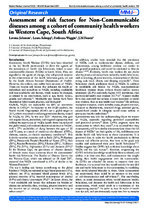| dc.description.abstract | Community Health Workers (CHWs) have been identified
as the key health professionals to drive the agenda of
the prevention of health risk behaviours, linked to noncommunicable diseases (NCDs) in South Africa. They are
regarded as the agents of change, who will provide impetus
to the achievement of the health behaviour goals, set out
by the South African National Department of Health1
.
However, this cohort, may suffer from an array of NCDs.
There are various risk factors that influence the health of
individuals and contribute to NCDs, including modifiable
and non-modifiable risk factors, which cannot be changed,
or altered by an intervention, such as age, family history,
gender and ethnicity2,3. Modifiable risk factors have been
classified as behavioural, physical, and biological4
.
Globally, NCDs are responsible for 80% of premature
deaths in LMICs5,6. In response to the NCD pandemic, the
World Health Organisation (WHO) set a global target in
2012, which was aimed at reducing premature deaths, caused
by NCDs, by 25%, by the year 20257
. However, this goal
will require drastic, immediate, and targeted approaches that
address the root causes of NCDs. South Africa has followed
the global trend, and evidence depicts an increase in NCDs8
,
with a 27% probability of dying between the ages of 30
and 70 years, as a result of cardiovascular diseases (CVDs),
diabetes, cancers, or chronic respiratory conditions7,9. This
is similar to other countries such as India (26%), Philippines
(28%), Democratic People’s Republic of Korea (27%), Mali
(26%), Russian Federation (30%), Ukraine (28%) , Tajikistan
(29%), Fiji (31%), Afghanistan (31%) and Armenia (31%)9
In the Western Cape, the prevalence of chronic diseases
of lifestyle raises major concerns about the communities’
health risk behaviour. The Burden of Disease Survey for
the Western Cape, which was released on 24 April 2017,
reported that NCDs contributed to 61% of deaths in the
Western Province10 | en_US |

